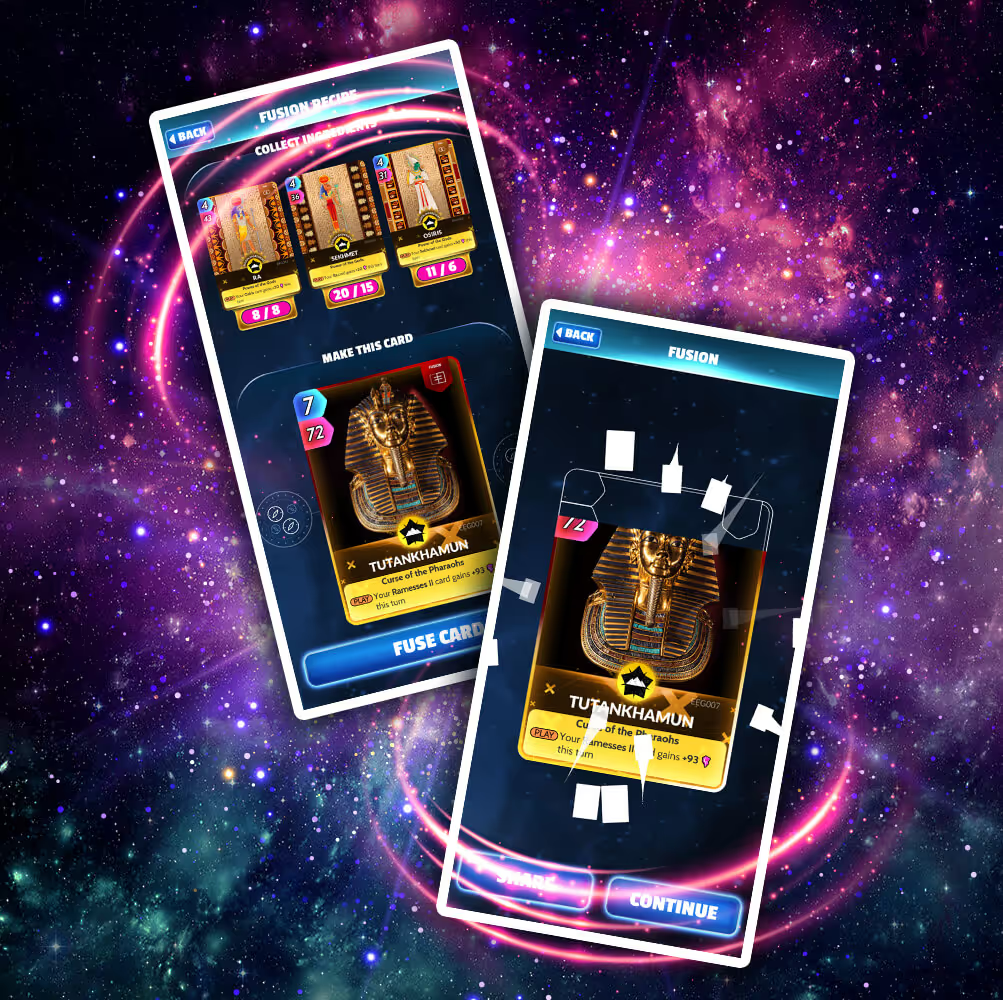Welcome to the world of Cards, the Universe and Everything! We appreciate that a card battling game with around 5000 cards that could cover literally everything might seem daunting but fear not! This starter guide is here to guide you through the basics and give you some tips for success. CUE isn’t about just copying a one-size-fits-all deck but rather about strategy, making smart choices and sometimes a dash of luck. Even if you don’t want to battle it out, there’s still plenty of fun to be had in becoming an eager card collector!
This guide introduces basic terms, card pack types, and strategies for new players, pointing to CUEniversity and the CUE Discord for in-depth resources, card lists, deck advice, trading, and community events.
In CUE, you’ll find information buttons throughout that provide helpful details. For instance, the icon at the top of the Card Collection, under Cards & Decks on the home screen, explains key points about card rarity, energy, and power.

CUE features around 5000 cards in two main types: Basic and Limited, identifiable by an icon on the card. Rarity varies from Common (no badge) to Legendary (gold badge with a gem outline).
Cards are organised into albums like History, with themed collections, such as Ancient Greece. Some collections blend Basic and Limited cards, others are exclusively Limited.
As you play, you'll earn special Level Up cards, not available in packs, which are valuable and rarely traded. Hold on to these as you won’t be able to get another, unless through trading!

Fusion cards, created from Basic cards marked as fusion ingredients, aren't found in packs. They're crafted by combining and sacrificing the required ingredients on the Fusion screen. New Fusions are released regularly, using a mix of old and new Basic cards as ingredients, often requiring a combination of Epic, Rare, and Common cards.
Mythic cards, extremely rare and powerful, have a slim chance of appearing in each pack, except in those with guaranteed contents. While exact odds are unknown, players estimate about 1 Mythic for every 750 to 1000 packs. Collectors don't typically chase Mythics through packs alone, but rather acquire them naturally while opening packs for other cards.

Crafting in CUE transforms multiple lower-rarity cards into a single higher-rarity card. Nine cards of one rarity craft into a random card of the next higher tier, helping you upgrade excess cards. For example, Common cards craft into a random Basic Rare, and so forth up to Legendaries crafting into a random Limited card. Only duplicate Basic cards can be crafted.
Occasionally, Avid introduces special Crafted cards, similar to Fusion cards but not available in packs. Their recipes are secret, requiring players to solve puzzles to discover them.

Different packs in the game contain a variety of Basic and Limited cards from various albums. Regular packs like "Marvellous Miscellany" offer Basic cards, and premium packs might include rarer cards or Limited cards.
Typical premium packs feature:
Other special packs may guarantee different card types. Each pack's description and an information icon provide the odds for obtaining various card types and rarities.
Limited cards are rarer and costlier than basic cards, making them more valuable. When trading, it's not advised to trade Basic for Limited cards. Always confirm you're getting Limited cards if that's what you're trading away.
In trades, Basic cards of the same rarity are usually equal in value, as are Limited Commons and Rares. But the worth of Limited Epics and Legendaries can differ greatly, depending on how useful they are in the game and how rare they are. Limited cards from guaranteed packs are typically less valuable than those from regular packs.
Battles consist of rounds with three turns each, where the player with the most points at the end of the three turns wins the round. If it's a tie, turns continue until there's a winner. The first to win three rounds wins the battle, taking 3 to 5 rounds.
Players have energy that increases each turn and is spent by playing cards. Cards have energy cost (blue) and power value (pink) at the top left corner, shown as E/P for energy/power.
Players can use up to three cards per turn, as long as their total energy cost doesn't exceed their available energy. The goal is to outmatch the opponent's power over the turns. Managing energy and power is crucial, as high-power cards cost more energy, and using too much power early might limit options later, but being too conservative can make it tough to win rounds.

Cards in CUE feature special abilities, enhancing or altering gameplay:
Abilities can apply to specific cards, collections, or situations, and vary in their timing and duration—some are immediate, while others last multiple turns or the entire game. This diversity allows for strategic gameplay beyond basic card power and energy management.

A deck consists of 18 cards. At the game's start, you draw 5 random cards. Each turn, you can play up to 3 cards, if you have enough energy, and you draw new cards to maintain a hand of 5.
Played cards cycle back into the deck in the order they were played, ensuring combos stay aligned for future draws. If you cycle three cards each turn, they'll reappear in your hand about two rounds later.
Game Modes:
In both modes, deck and strategy flexibility is key, with some players keeping a core deck and making minor adjustments to adapt to weekly league changes.
The season pass is a feature in the game that offers players an opportunity to earn additional rewards by playing games and completing quests. It consists of two tracks: a free track accessible to all players, and a premium track that offers extra rewards for those who choose to upgrade.
Besides the usual arena and league formats, CUE includes Events. This mode of gameplay introduces special gameplay changes that impact all players, such as boosting the power of rare cards or changing the amount of energy in certain rounds. Every event has its unique rules, adding fresh strategic elements to the game.
CUE offers around 5000 cards to build your 18-card deck, without a fixed "best" deck or meta. Success comes from skillful deck building, play, and luck. Even decks with Basic cards can win against those with rarer, more powerful cards if played strategically.
Strategy Tips:

A well-rounded deck includes energy generators, high-power cards, supportive combos, and buffs, accessible even to new players. The showcased "Sharks and Old West" deck exemplifies this, optimised for casual play and capable of defeating bots. It features energy generators like Thunderstorms and Brontosaurus for early boosts, 2-card combos that require strategic play, and shark cards that benefit from buffs, enhancing the deck's power.
Energy management and combo coordination are crucial. Playing energy generators early maximises benefits, while strategic combo play like Doc Holliday and Wyatt Earp, and card holding tactics for Fangtooth Moray and The Moon, enhance power efficiency. Subcategory buffs from cards like Nurse Shark and Thresher Shark lower energy costs and boost power, leveraging the synergy within the deck.

General buffs, such as those from Stingray and Water Strider, increase power across various cards, with specific strategies needed to maximise their effects. Cards like The Moon and Molly Maguires offer additional power boosts under certain conditions, emphasising the importance of strategic drawing and playing for maximising round advantages. This approach highlights the depth of strategy and adaptability within CUE's deck-building and gameplay.
Most decks combine card combos and subcategory buffs to enhance overall power beyond individual card abilities. Alternative strategies include:
Specialised decks, often relying on Limited cards, offer unique strategies but are more complex and less suitable for new players. Examples include: